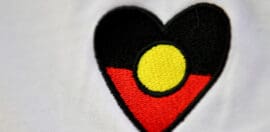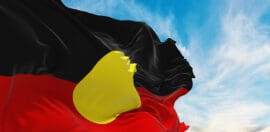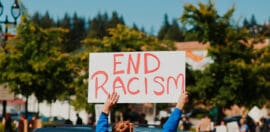Body image campaign targets Aboriginal and Torres Strait Islander communities slipping through the cracks

Garra Mundine
12 April 2021 at 4:56 pm
The Butterfly Foundation campaign is aiming to get Aboriginal and Torres Strait Islanders talking about their body image concerns
When Garra Mundine, a proud Wiradjuri, Bundjulung, Kamilaroi and Yuin woman from Dubbo NSW, moved away from her community at the age of 11 to go to school in Sydney, she began to notice her body was different to everyone else’s.
“Before I moved to Sydney, I was constantly surrounded by family and close friends who looked like me. And so I wasn’t really aware [of my body image] until I moved to the city,” Mundine told Pro Bono News.
“My new school was incredibly multicultural and a lot of my friends were of Irish, Italian and Asian heritage. They were a lot smaller than I was and my body seemed to change a lot faster than theirs did.”
In an attempt to fit in and look smaller, Mundine developed an eating disorder.
“I wasn’t taught about healthy eating or anything like that… so I just restricted what I was eating. And then it progressed to the point where I wasn’t eating anything at all,” she said.
She said that for many years, she had no idea where or how to seek help, because eating disorders weren’t something she ever discussed when she was growing up.
“Aboriginal and Torres Strait Islander communities are already dealing with so much trauma on top of body image concerns,” she said.
“We were incredibly poor when I was young, and so the main focus was on just getting food on the table. There’s just so many other issues that seem more important that need to be focused on.”
She added that when she did try and seek professional support, there was no culturally safe help available.
“I went to an Aboriginal health service, but the doctor wasn’t Aboriginal or Torres Strait Islander, and I felt that she was not empathetic to my situation at all,” she said.
“That experience definitely scared me away from looking for professional help.”
Aboriginal and Torres Strait Islanders falling through the cracks
According to research by the Butterfly Foundation (Butterfly), around one in 10 young Australians will have an eating disorder in their lives, including Aboriginal and Torres Strait Islanders.
But Camilla Becket, the Butterfly’s marketing coordinator, told Pro Bono News that a key difference for Aboriginal and Torres Strait Islanders was they were less likely to know what the signs of an eating disorder were and how to seek help.
“We know through research that eating disorders can affect anybody, anywhere, any time,” Becket said.
“But if you are an Aboriginal and Torres Strait Islander person struggling with an eating disorder, you might not identify that as an eating disorder or a mental health issue… because the referral pathways are really lacking.”
To address the issue, the Butterfly has launched the #EveryBODYisDeadly campaign, which will attempt to get Aboriginal and Torres Strait Islander people talking about their body image and eating concerns and to reach out to Butterfly for culturally safe support.
The campaign was created with the help of Aboriginal and Torres Strait Islander health workers and people with lived experience, and Butterfly staff have received and will continue to receive cultural awareness training.
“We have a fully staffed helpline so people can call in anonymously, get support, and yarn it out,” Becket said.
Mundine is now on the path to recovery, finding a healthy balance and receiving professional support, but she said having a campaign like this around when she was struggling would have made a world of difference.
“If it [the campaign] was around at the height of my eating disorder and my mental health issues, it would have meant so much,” she said.
“This is a very big issue within Indigenous communities and we need to really talk about it. It can’t be swept under the rug, and instead we need to build a support network around Aboriginal and Torres Strait Islander people so they can face it.”
If you, or someone you know is struggling with body image issues or an eating disorder, call The Butterfly Foundation’s free national helpline on 1800 33 4673, open seven days a week, 8am AEST – midnight.







